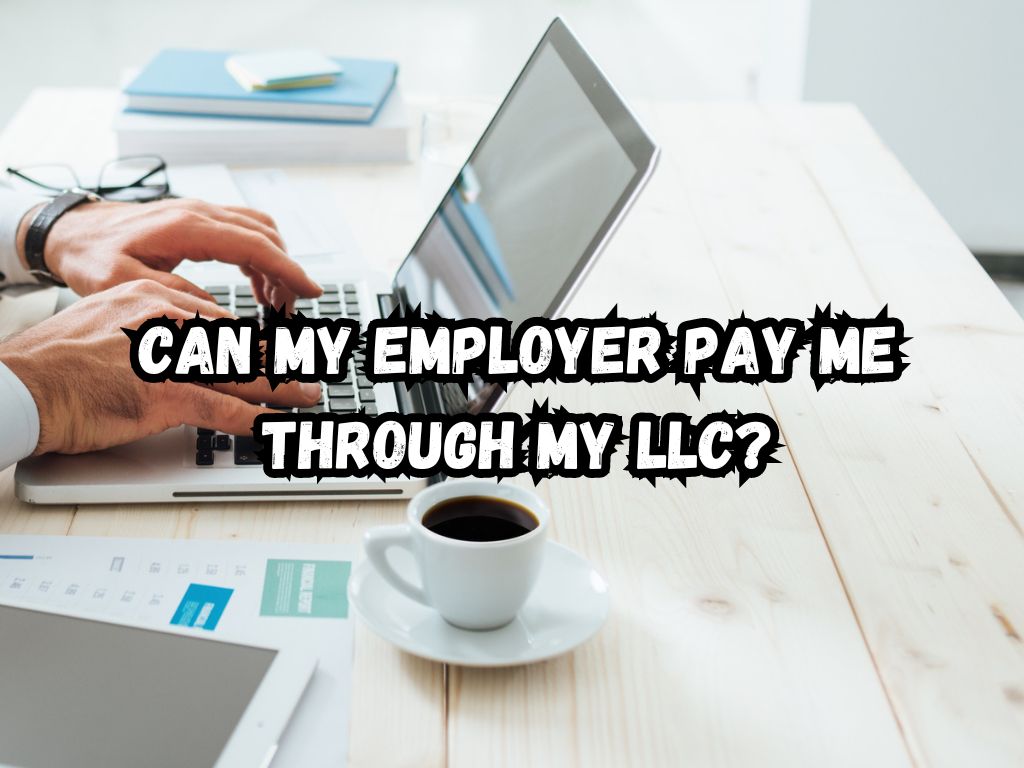In today’s business landscape, many individuals choose to operate as independent contractors or freelancers through Limited Liability Companies (LLCs).
However, some may wonder can my employer pay me through my LLC, This article aims to explore the legality, tax implications, and benefits associated with employer payments through LLCs.
By understanding these factors, both employers and employees can make informed decisions regarding payment arrangements.
Understanding LLCs
LLCs, or Limited Liability Companies, offer business owners a flexible and protective structure for their operations. Here are some key aspects to understand:
Definition of LLCs
An LLC is a legal entity that provides liability protection to its members while maintaining a degree of flexibility in its management structure.
It combines features of both corporations and partnerships, allowing owners (known as members) to enjoy personal asset protection while benefiting from pass-through taxation.

Types of LLCs
LLCs can be single-member or multi-member. Single-member LLCs have only one owner, while multi-member LLCs have multiple owners.
Advantages of LLCs
LLCs offer several advantages, such as limited personal liability for its members, flexible management structures, pass-through taxation (unless the LLC elects to be taxed as a corporation), and potentially simpler formation requirements compared to corporations.
Disadvantages of LLCs
Some disadvantages of LLCs include the potential for self-employment taxes, additional paperwork and filing requirements, and varying regulations among states.
Can My Employer Pay Me Through My LLC? What Do The Rules Say?
When it comes to employer payments through LLCs, several legal considerations come into play. It is important to ensure compliance with employment and tax laws, as well as the proper establishment and maintenance of the LLC.
Here are some key points to consider:
Legal considerations
Employers must establish a lawful payment arrangement that adheres to employment and tax laws. They must classify employees correctly and follow the appropriate payment and reporting requirements.
Failure to do so can lead to legal consequences for both the employer and the employee.
Tax implications
LLCs are typically treated as pass-through entities for tax purposes. This means that the LLC’s income is generally taxed on the individual tax returns of its members.
However, if the LLC elects to be taxed as a corporation, different tax rules apply. Employers and employees must be aware of the tax implications associated with payment arrangements made through an LLC.
Advantages for employers
Paying employees through an LLC offers certain advantages for employers. It can provide liability protection for the business and potentially simplify tax reporting. It may also allow for more flexibility in payment structures and deduction opportunities.
Advantages for employees
Employees who receive payments through an LLC may enjoy certain benefits, such as limited personal liability for business-related debts, the potential for tax deductions related to their employment, and the ability to establish their own business identity.
Disadvantages for employers and employees
It is important to recognize the potential disadvantages as well. Setting up and maintaining an LLC involves additional administrative tasks and costs.
It may also complicate matters if the employer wants to change the payment structure or terminate the employment relationship.
Setting Up an LLC for Employer Payments
For an employer to pay an employee through an LLC, the LLC must be properly set up and comply with legal requirements. Here are some important steps and considerations:
Steps to set up an LLC
Establishing an LLC involves choosing a unique name for the LLC, filing the necessary formation documents with the state, and paying any required filing fees.
The specific steps may vary by state, so it is important to research and follow the guidelines of the relevant jurisdiction.

Legal requirements
Employers must also ensure compliance with legal requirements throughout the life of the LLC. This includes maintaining proper records, filing annual reports, and adhering to any ongoing reporting and tax obligations.
Tax implications
Employers and employees should consult with an accountant or tax professional to understand the tax implications of setting up an LLC for employer payments.
They may need to obtain an Employer Identification Number (EIN) from the IRS, and the LLC’s income and expenses must be accurately reported for tax purposes.
Frequently Asked Questions
Can an LLC be used to avoid paying taxes?
Employers must not use an LLC to unlawfully evade taxes. While LLCs offer certain tax advantages, intentionally misclassifying employees as independent contractors or manipulating payment structures to evade taxes is illegal.
Can an LLC be used to avoid liability?
LLCs provide liability protection to their members, shielding personal assets from business-related debts or legal issues. However, this protection is not absolute, and instances of fraud, personal negligence, or breach of legal obligations can expose members to liability.
Pro Tips
Here are some additional tips to consider when it comes to employer payments through LLCs:
Consult with a lawyer and accountant before setting up an LLC
Seeking legal and financial guidance helps ensure that all aspects are adequately addressed during the LLC formation process. They can provide valuable insights based on the specific circumstances and requirements.
Keep accurate records of all payments and transactions
Accurate record-keeping is essential for financial and tax purposes. Employers should maintain records of payments made through the LLC, including invoices, receipts, and any relevant employment contracts.
Understand the tax implications of employer payments through LLCs
Familiarize yourself with the tax rules and obligations associated with employer payments through an LLC. This knowledge will help both employers and employees navigate the tax landscape effectively and avoid potential pitfalls.
Conclusion
Paying employees through an LLC can be a legally viable option for employers who comply with employment and tax laws.
However, it is imperative to understand the proper set-up and maintenance of the LLC, as well as the associated tax implications. Employers must never engage in any illegal practices, such as tax evasion or employee misclassification, when utilizing LLCs for payments.
By adhering to legal requirements and seeking professional advice when necessary, employers and employees can navigate the complexities of employer payments through LLCs successfully.


 Tags:
Tags:










